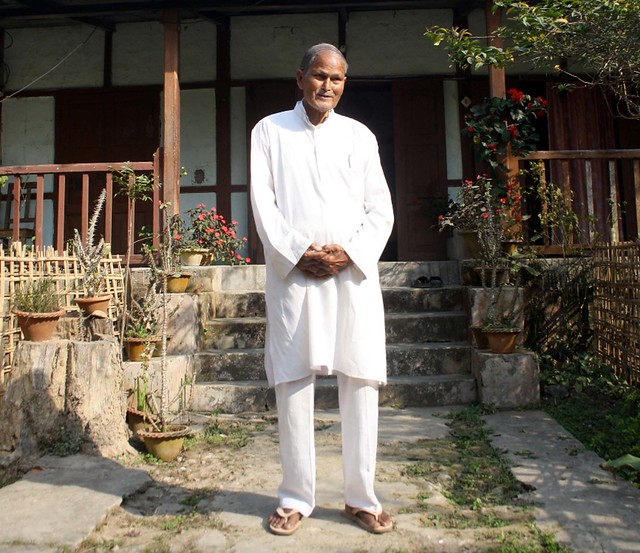By Abdul Gani, TwoCircles.net,
Guwahati: The man who was among the very few last living persons to have personally met and interacted with Mahatma Gandhi, the 94 year old Janardan Pathak of Assam breathed his last on Monday night in his residence in Karbi Anglong’s Diphu.
The veteran Gandhian who recently won the first ‘Amal Prabha Das Award for Social Service’ by the state government for his immense contribution was suffering from old age related ailments, according to the family sources, at the time of his demise.

Janardan Pathak at his residence and at his Seva Kendra (File Photo)
His demise has left a void which will be almost difficult to fill up in the field of social service.
“Pathak has set a supreme example of sacrifice by dedicating his life for the welfare of the tribal people. Besides, he was one of the very few people who were lucky enough to interact with Gandhiji personally. He tirelessly continued to serve the people till his last breath,” Natwar Thakkar, another seasoned Gandhian and social worker told TCN.
Pathak was born at a place called Tihu in Nalbari district in 1921. He went to Agra and Wardha, Maharashtra to pursue higher studies where he came in touch with Mahatam Gandhi in mid 1940s.
Pathak was known for his selfless service to cure the leprosy affected hill people in the state being influenced by Mahatma Gandhi. He arrived in Karbi Anglong in the month of September in 1948 to serve the people. He also established Mikir Hills Seva Kendra on October 2 in the same year.
Assam chief minister Tarun Gogoi has expressed his condolences at the demise of Pathak.
He was always loved and respected by the people for his sacrifice. Noted author Pabitra Borah who also penned a biography of Pathak rued at the negligence by the government.
“He was such a great example of sacrifice for the sake of humanity. But unfortunately the government did not do much to recognize his service. His recognition by the state government came very late. It’s a sorry state to see how such great souls are neglected like this. Pathak sir, however, never concerned for all these and continued doing what he liked doing,” said Borah.
On January 28 this year the state government handed over him the first ‘Amal Prabha Das Award for Social Service’ for his immense services to the society. Pathak had immediately donated the money for the cause of financially weak meritorious students of his district. “Our father of the nation Mahatma Gandhi always taught us to help the needy,” Pathak had said.
‘Jansevak Janardhan, the spark’ is the name of biography written by Borah in a bid to document Pathak’s life.
During an earlier interview with this correspondent Pathak had said that the January 30 in 1948 was the most tragic day of his life and which changed the course of his journey forever.
“It was a dark moment for humanity. I was stunned to hear that father of the nation was killed and only I could do was to pick up a fistful of earth and dedicate my life in the path of Gandhiji. I could not sleep the whole night,” he had said.
He was then staying at the national hostel of Govindram Seksaria College of Commerce, Wardha to pursue his masters’ degree in Commerce.
According to Thakkar Bapa, after Gandhi’s aid, Pathak landed in Mikir Hills (now Karbi Anglong) in the month of September in 1948 to serve the Leprosy affected hill people and on October 2 in the same year he established Mikir Hills Seva Kendra.
“Leprosy was a huge problem in this area and as I always wanted to work among the tribal people in the hills Thakkar Bapa send me here. There were several thousand leprosy patients in the entire districts and at the Sariahjan area alone we found 57 such patients,” he had said.
Pathak had the opportunity to meet Gandhi on three occasions and he clearly remembers those occasions as moments of pride. It was on May 25 in 1945 when he along with two other friends went to meet Gandhi at his Sevagram Ashram. “He advised me to finish my study first and then to follow Thakkar Bapa’s guidance,” he had said.
His decision also created a nuisance in his family as their family had a huge business in Barpeta. His brothers wanted him to join in their business and earn money. But he preferred to have his own ‘businesses’ on humanity.
“He was too humble. He wanted to maintain a very low profile life and always stayed away from limelight. Sometimes, even we were surprised to see him go so silently in his life,” his son Nayan Pathak said.
He continued to play a vital role in all round development of Karbi Anglong besides his humanitarian works. Pathak also went on to become the founding vice chairman of Mikir Hills District Council in the year 1952.
“His personality was really amazing. Being a non-Karbi be became the VC of the council and so on. I feel, he, at least deserved a Padma award for his works to be a source of inspiration for the generations to come,” biographer Borah said.

